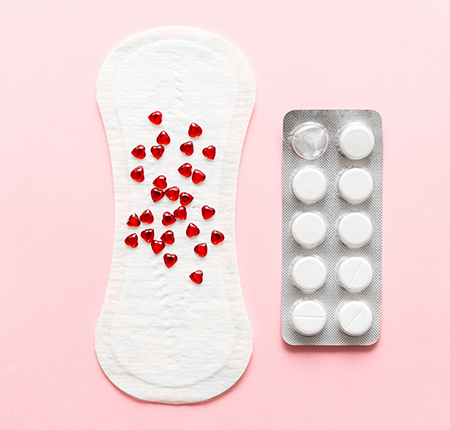
Menorrhagia (abundant menstruation) - What is it & how does it manifest itself?
Have you experienced heavy vaginal bleeding at least once, but thought it was normal? Maybe even your gynecologist has assured you that you are healthy and that you have nothing to worry about. However, menstruation should not affect your normal activity and general well-being, so if you experience discomfort like changing your pad every two hours, you may be dealing with a frequent menstrual disorder: menorrhagia.
What is menorrhagia?
Menorrhagia is the medical term used to describe heavy and prolonged menstruation. Although heavy menstrual flow is a common concern of many women, most do not have blood loss so significant that it would be classified as menorrhagia.
Symptoms - How is menorrhagia manifested?
When you face menorrhagia, you cannot carry out your daily activities normally, and massive blood loss and menstrual cramps become a real problem.
Of course, there is no medical recommendation for how much blood is normally lost during menstruation, but based on past experience, you will be able to tell if your period is heavier. Menorrhagia is usually accompanied by constant pain in the lower abdomen and large blood clots. We talk about clots in detail in the article you can find here.

Signs and symptoms of menorrhagia also include:
filling one or more sanitary pads per hour for several consecutive hours
the need to use double protection to control menstrual flow
the need to get up during the night to change the pad
bleeding lasting more than 7 days
restriction of daily activities as a result of heavy menstrual flow
symptoms specific to anemia, such as fatigue, lack of moisture or difficulty breathing
Normal menstruation vs. heavy menstruation
The menstrual cycle has a typical period of 28 days (with fluctuations between 25 and 35 days), with menstruation lasting about 4-5 days. Worrying is when the bleeding lasts more than 7 days and it is necessary to change the absorbent less than two hours.
You can read more about menstruation and everything it means in our article Menstruation - EVERYTHING you need to know.

A normal period produces a total blood loss of 30-40 milliliters, but when it comes to menorrhagia, the amount of vaginal bleeding will double at least.
When is it advisable to go to the doctor?
If you experience the following symptoms, you should definitely see a doctor:
vaginal bleeding so heavy that it fills at least one pad per hour for more than two hours
bleeding between periods or irregular vaginal bleeding
any vaginal bleeding after menopause

Heavy menstruation - Causes
Sometimes the causes of bleeding remain unknown, other times they are signs of a more serious condition. These include:
- Hormonal imbalance: during a normal menstrual cycle, the balance between the hormones estrogen and progesterone regulates the thickening of the uterine lining, which breaks and is shed during menstruation; in the event of an imbalance, the mucosa will overgrow and lead to massive hemorrhage.
- Ovarian dysfunction: If the ovaries do not release the egg during the menstrual cycle, the body will not produce the hormone called progesterone, which leads to menorrhagia.
- Uterine fibroid: This non-cancerous (benign) tumor develops in the uterus during a woman's fertile period and can trigger heavy or prolonged menstrual bleeding.
- Intrauterine devices: menorrhagia is one of the side effects of using intrauterine devices as a contraceptive method.
- Pregnancy complications: A single heavy and late period may occur as a result of a miscarriage (spontaneous) or may occur due to abnormal placement of the placenta.
- Cancer: Uterine or cervical cancer can cause heavy periods, especially if you are postmenopausal.
- Inherited clotting disorders: Some blood disorders can be genetically inherited and can cause abnormal menstruation.
- Medicines: anti-inflammatories, hormonal medicines (estrogen, progestins) or anticoagulants can contribute to heavy and prolonged periods.
- Other conditions: Liver disease, kidney disease, and other conditions may be associated with menorrhagia.
Risk factors - Who can have menorrhagia?
Depending on your age and other conditions, risk factors may explain the menorrhagia you experience. In a normal cycle, the release of the egg stimulates the body to produce progesterone, the female hormone responsible for maintaining the regularity of menstrual periods. When the egg is not released, insufficient progesterone can cause heavy menstruation.
Adolescent menorrhagia is usually caused by anovulation. They are especially prone to anovulatory cycles in the first year after the first menstrual period.
Menorrhagia in older women is typically caused by uterine pathology, such as fibroids and other conditions mentioned previously.
Menorrhagia - Diagnosis
To make a diagnosis, your doctor will ask you questions about your medical history and menstrual cycles. It is quite possible that you will be advised to keep track of days without bleeding, but also to add notes according to blood flow, the amount of absorbents used and others.

Other analyzes that may be recommended by the doctor are:
Blood tests
Babes Pap test
Endometrial biopsy
Ultrasound
Sonohysterography
Hysteroscopy
Menorrhagia - Treatment
The treatment is customized according to several aspects, including:
general health and medical history
the cause and severity of the disease
tolerance to certain drugs, procedures and therapies
maternity plan
the effects of the condition on lifestyle
personal preferences
So there is no universally valid treatment, but most of the time it includes drugs and/or procedures.
Drug treatment
For menorrhagia, nonsteroidal anti-inflammatory drugs, tranexamic acid, oral contraceptives, orally administered progesterone, hormonal intrauterine devices can be prescribed. If you suffer from anemia, iron supplements can be added to the prescription.

Surgical treatment
If drug therapy has not been successful, surgical options may be recommended, such as:
Dilation and curettage - the doctor opens the cervix and cleans the tissue of the uterine lining to reduce menstrual bleeding. This procedure is common and successful, although you may need to repeat the procedure if the menorrhagia returns.
Uterine artery embolization - for women whose menorrhagia is caused by uterine fibroids, the purpose of the procedure is to shrink the fibroids in the uterus by blocking the uterine arteries and stopping their blood supply.
Ultrasound surgery - this procedure treats bleeding caused by fibroids by shrinking them, and the intervention does not involve incisions.
Myomectomy - through this procedure, the uterine fibroid will be surgically removed, and depending on the size, number and positioning, the intervention can be done at the level of the abdomen or through the vagina and cervix.
Hysterectomy - this is the procedure by which the uterus and cervix are removed as a permanent solution that causes sterility and ends menstrual periods.
Untreated menorrhagia - Complications
If menorrhagia remains untreated, it can lead to complications such as anemia and severe pain.
Anemia occurs as a result of blood loss by reducing the number of red blood cells. Menorrhagia can reduce iron levels enough to increase the risk of iron deficiency anemia. Signs and symptoms are: pale skin, weakness and fatigue. Although diet plays an important role, the problem is complicated by heavy menstrual periods.
As for severe pain, it occurs with menorrhagia and is manifested by painful and prolonged cramps.
Prevention of menorrhagia
To take care of yourself, go for a full gynecological evaluation every year where the doctor will be able to give you advice based on your needs and, in addition, can detect problems early, if any.
We also have some tips for you:
Make sure you always have a healthy diet and a balanced lifestyle that excludes stress and lack of sleep.
Establish a regular schedule to exercise.
Treat intimate hygiene seriously, change used absorbents.
Use anti-inflammatories if you want to reduce menstrual discomfort.
Heavy menstruation in premenopause
Premenopause affects the length and frequency of periods, so periods tend to be shorter and cycles may become irregular. Light bleeding outside of your period is common, so to always feel safe and secure, choose 100% organic protection. ENROUSH's revolutionary products are created by women for women and put health and care for your body first.

The absorbents and tampons are made of 100% GOTS certified organic cotton and contain practically only what we would use for our bodies. No chemicals, no plastic or chlorine, nothing that could unbalance the pH of your intimate area, and what's more, you can say goodbye to vaginal irritation or dryness. Comfortable and safe, leave your period worries in nature's hands with the planet-friendly Enroush pads and pads. We care about you and your well-being.
Heavy menstruation after childbirth
Immediately after giving birth, women have very heavy bleeding, so it is not a cause for concern. This bleeding is heavy during the first 5-7 days of the immediate postpartum period and lasts for 3 to 4 weeks.






















